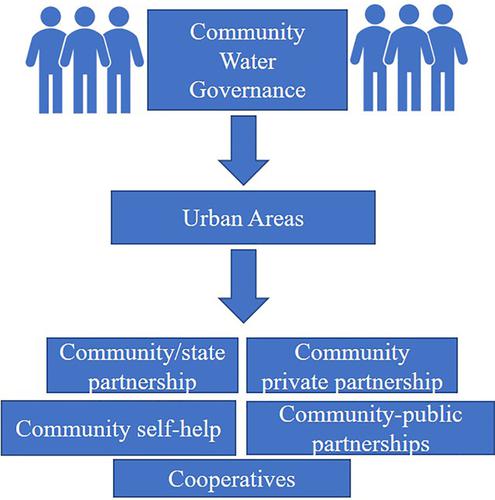当前位置:
X-MOL 学术
›
WIREs Water
›
论文详情
Our official English website, www.x-mol.net, welcomes your feedback! (Note: you will need to create a separate account there.)
Community water governance for urban water security in the Global South: Status, lessons, and prospects
WIREs Water ( IF 8.2 ) Pub Date : 2020-07-02 , DOI: 10.1002/wat2.1466 Ellis A. Adams 1 , Leo Zulu 2 , Quinn Ouellette‐Kray 1
WIREs Water ( IF 8.2 ) Pub Date : 2020-07-02 , DOI: 10.1002/wat2.1466 Ellis A. Adams 1 , Leo Zulu 2 , Quinn Ouellette‐Kray 1
Affiliation

|
As public and private water policies fail to address urban water insecurity in the Global South, community‐based water governance (CWG) has emerged as an alternative. However, systematic understanding of the current state, performance, and future opportunities of urban CWG remains lacking. We critically review literature (75 case studies from 1990 to 2019) on urban CWG in the Global South, focusing on the current scope and status of knowledge; importance, challenges, innovations, and opportunities; and prospects for scaling up CWG to enhance water security in urban areas. Institutional arrangements, scope and complexity, capacity, and outcomes of CWG varied widely. Most case studies showed improvements in water quantity, supply reliability, pricing, community empowerment, employment, reduced nonrevenue water, and financial viability. Community partnerships with nongovernmental organizations, private‐sector agents, public utilities, and donors; technological innovations; and community autonomy were important for financial sustainability, asset security, and service improvements. Many CWG interventions however remained fragmented, limited in geographic scope, and were undermined by poor funding, weak infrastructure and capacity, political interference, overburdening of poor communities, and collective‐action challenges surrounding elite capture, marginalization, and unequal benefit sharing. We argue that these challenges notwithstanding, CWG interventions offer more benefits than failures and remain critical alternatives for urban water security in the Global South. New research is needed to understand the impact of CWG under diverse settings, the role of incentives and financing mechanisms, and how persistent collective‐action challenges including gendered participation and marginalization undermine CWG.
中文翻译:

全球南方城市水安全的社区水治理:现状,经验教训和前景
由于公共和私人水政策未能解决全球南方的城市水不安全问题,基于社区的水治理(CWG)已经成为一种替代方案。但是,仍然缺乏对城市CWG的当前状态,性能和未来机会的系统理解。我们重点回顾了有关全球南方城市CWG的文献(1990年至2019年的75个案例研究),重点是知识的当前范围和状况; 重要性,挑战,创新和机会;扩大CWG以增强城市地区水安全的前景。CWG的机构安排,范围和复杂性,能力和成果差异很大。大多数案例研究表明,水量,供应可靠性,价格,社区赋权,就业,无收益水减少和财务生存能力得到改善。与非政府组织,私营部门代理商,公共事业和捐助者的社区伙伴关系;技术创新;社区自治对于财务可持续性,资产安全性和服务改进至关重要。但是,许多CWG干预措施仍然是分散的,受地域限制的,并且由于资金不足,基础设施和能力薄弱,政治干预,贫困社区负担过重以及围绕精英捕获,边缘化和不平等利益共享的集体行动挑战而受到破坏。我们认为,尽管面临这些挑战,但CWG的干预措施带来的好处多于失败,并且仍然是全球南方城市水安全的重要替代方案。需要开展新的研究来了解CWG在不同环境下的影响,
更新日期:2020-07-02
中文翻译:

全球南方城市水安全的社区水治理:现状,经验教训和前景
由于公共和私人水政策未能解决全球南方的城市水不安全问题,基于社区的水治理(CWG)已经成为一种替代方案。但是,仍然缺乏对城市CWG的当前状态,性能和未来机会的系统理解。我们重点回顾了有关全球南方城市CWG的文献(1990年至2019年的75个案例研究),重点是知识的当前范围和状况; 重要性,挑战,创新和机会;扩大CWG以增强城市地区水安全的前景。CWG的机构安排,范围和复杂性,能力和成果差异很大。大多数案例研究表明,水量,供应可靠性,价格,社区赋权,就业,无收益水减少和财务生存能力得到改善。与非政府组织,私营部门代理商,公共事业和捐助者的社区伙伴关系;技术创新;社区自治对于财务可持续性,资产安全性和服务改进至关重要。但是,许多CWG干预措施仍然是分散的,受地域限制的,并且由于资金不足,基础设施和能力薄弱,政治干预,贫困社区负担过重以及围绕精英捕获,边缘化和不平等利益共享的集体行动挑战而受到破坏。我们认为,尽管面临这些挑战,但CWG的干预措施带来的好处多于失败,并且仍然是全球南方城市水安全的重要替代方案。需要开展新的研究来了解CWG在不同环境下的影响,


























 京公网安备 11010802027423号
京公网安备 11010802027423号